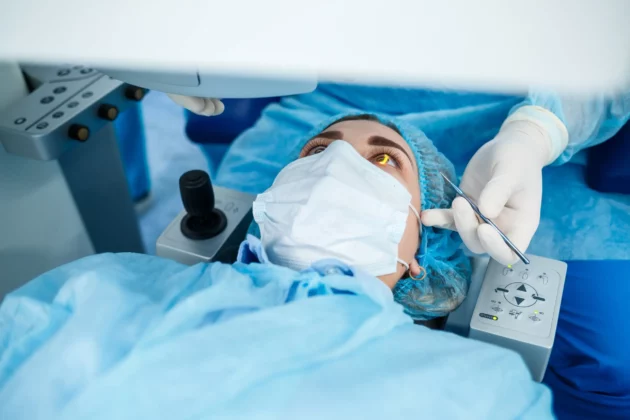
Stepping into the unknown can often stir a whirlpool of doubts and fears, especially when it pertains to a procedure involving something as vital as our eyes. If you find yourself on the verge of undergoing a corneal transplant, you might be grappling with a flurry of questions, the most daunting of them all being, “Will it be painful?”
In this comprehensive guide, we aim to dispel myths, and most importantly, equip you with knowledge. Knowledge that demystifies the procedure, outlines pain management techniques, and ultimately, puts you at ease. So, take a deep breath as we unravel the reality of corneal transplant.
Contents
A corneal transplant, also known as a corneal graft or keratoplasty, involves the replacement of a damaged or diseased cornea with a healthy one, usually sourced from a donor. This procedure has been a beacon of hope for many, promising restored vision and improved quality of life.
The surgery generally encompasses a few primary techniques, each tailored to address specific issues. These are:
As you find yourself on the cusp of making a decision about corneal transplant surgery, one question might overshadow others: “Is the procedure painful?” It’s completely natural to harbor such concerns, given that surgery, to many, is synonymous with pain. However, we are here to assuage those fears by delving into why the surgery is not as painful as you might imagine.
Firstly, let’s unequivocally state that NO, the corneal transplant surgery is not painful. The foremost reason behind this is the proficient use of anesthesia during the procedure.
Depending on the particulars of your case, you will be administered either local or general anesthesia. Local anesthesia works wonders in numbing the area surrounding the eyes, ensuring that you are insulated from any pain during the surgery. In cases where general anesthesia is employed, you would be in a state of controlled unconsciousness, completely detached from any sensations of pain.
Even after the surgery, the medical team remains steadfast in monitoring and managing any potential discomfort during the recovery phase. Though mild to moderate discomfort might be experienced post-surgery, it is well-managed through prescribed pain relievers, ensuring a smooth and comfortable recuperation journey.
Furthermore, it’s essential to recognize that pain is a subjective entity, with variations in individual thresholds. Rest assured, the surgical team is adept at tailoring pain management strategies to align with each individual’s unique needs, thus paving the way for a largely pain-free experience.
Therefore, as you approach this significant step in reclaiming your vision, it’s comforting to know that your well-being and comfort are of paramount importance to the medical team. Feel free to communicate any concerns with your surgeon, fostering a relationship of trust and openness, which can indeed set a positive foundation for successful surgery and recovery.
By following these guidelines, you equip yourself with the tools to navigate the post-operative period with minimal discomfort, fostering a speedy and successful recovery. Remember, the goal is to march towards a future with enhanced vision and improved quality of life, and managing post-operative pain adeptly is a significant step in that direction.
In the initial days following the surgery, you might experience mild discomfort, sensitivity to light, or foreign body sensation in the eye. These are normal reactions as your body adjusts to the changes post-procedure.
During this period, adherence to medications as prescribed by your healthcare provider is crucial. These medications will not only help manage potential discomfort but also prevent infections. Consistent follow-up appointments will allow your surgeon to monitor your progress and adjust treatment plans as necessary.
As days progress, you will notice a gradual improvement in your vision and a decrease in discomfort. However, it’s essential to tread cautiously and avoid engaging in strenuous activities that might put pressure on your eyes. You should follow a phased approach when resuming your regular activities, always considering the advice of your healthcare provider.
In this final phase, you would be well on your path to recovery, with most of the initial discomfort significantly reduced. Here, the focus shifts towards embracing a lifestyle that supports long-term eye health, including incorporating specific dietary choices and protective measures for your eyes.
Remember, each individual’s recovery journey is unique, and patience is key. Maintaining open communication with your healthcare provider will enable a tailored approach to your recovery, ensuring a smoother, pain-free journey towards restored vision.
In conclusion, while the recovery from a corneal transplant is a gradual process, spanning several months, it leads to a promising horizon of clearer, better vision. Stay in close consultation with your doctor and follow the recommended guidelines to ensure a smooth, successful recovery journey.
Stepping into a brighter, clearer world post a corneal transplant is a life-changing experience. While the prospect of surgery might seem daunting, armed with the right information and guidance, you can navigate this path with confidence.
If you find yourself grappling with cornea-related issues and seek a reliable, expert solution, don’t hesitate any longer. Cornea Transplant Surgery at EyeMantra is here to assist you in rediscovering the joy of clear vision. Book your free appointment now at 9711116605 and take the first step towards a brighter, clearer future.